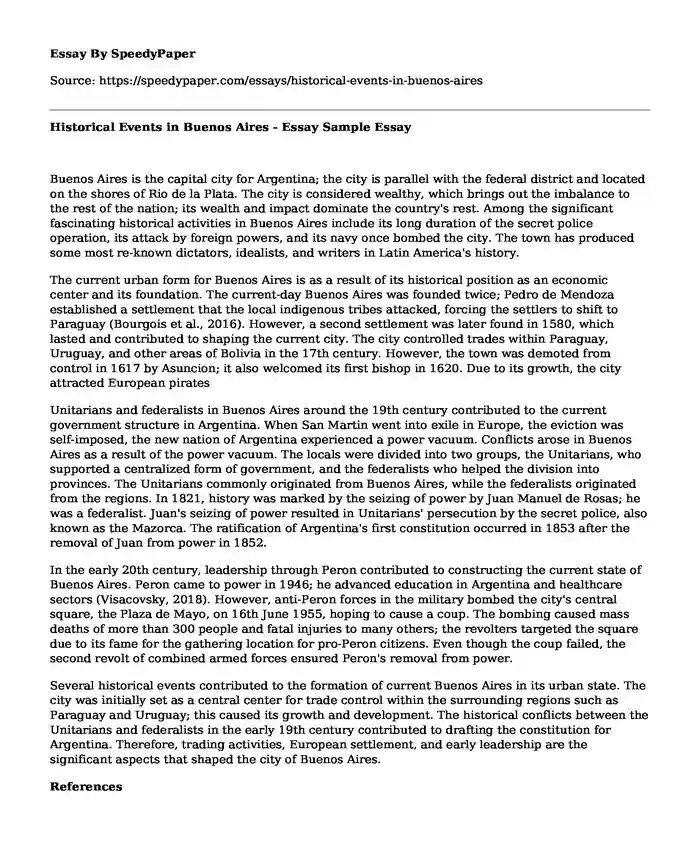Buenos Aires is the capital city for Argentina; the city is parallel with the federal district and located on the shores of Rio de la Plata. The city is considered wealthy, which brings out the imbalance to the rest of the nation; its wealth and impact dominate the country's rest. Among the significant fascinating historical activities in Buenos Aires include its long duration of the secret police operation, its attack by foreign powers, and its navy once bombed the city. The town has produced some most re-known dictators, idealists, and writers in Latin America's history.
The current urban form for Buenos Aires is as a result of its historical position as an economic center and its foundation. The current-day Buenos Aires was founded twice; Pedro de Mendoza established a settlement that the local indigenous tribes attacked, forcing the settlers to shift to Paraguay (Bourgois et al., 2016). However, a second settlement was later found in 1580, which lasted and contributed to shaping the current city. The city controlled trades within Paraguay, Uruguay, and other areas of Bolivia in the 17th century. However, the town was demoted from control in 1617 by Asuncion; it also welcomed its first bishop in 1620. Due to its growth, the city attracted European pirates
Unitarians and federalists in Buenos Aires around the 19th century contributed to the current government structure in Argentina. When San Martin went into exile in Europe, the eviction was self-imposed, the new nation of Argentina experienced a power vacuum. Conflicts arose in Buenos Aires as a result of the power vacuum. The locals were divided into two groups, the Unitarians, who supported a centralized form of government, and the federalists who helped the division into provinces. The Unitarians commonly originated from Buenos Aires, while the federalists originated from the regions. In 1821, history was marked by the seizing of power by Juan Manuel de Rosas; he was a federalist. Juan's seizing of power resulted in Unitarians' persecution by the secret police, also known as the Mazorca. The ratification of Argentina's first constitution occurred in 1853 after the removal of Juan from power in 1852.
In the early 20th century, leadership through Peron contributed to constructing the current state of Buenos Aires. Peron came to power in 1946; he advanced education in Argentina and healthcare sectors (Visacovsky, 2018). However, anti-Peron forces in the military bombed the city's central square, the Plaza de Mayo, on 16th June 1955, hoping to cause a coup. The bombing caused mass deaths of more than 300 people and fatal injuries to many others; the revolters targeted the square due to its fame for the gathering location for pro-Peron citizens. Even though the coup failed, the second revolt of combined armed forces ensured Peron's removal from power.
Several historical events contributed to the formation of current Buenos Aires in its urban state. The city was initially set as a central center for trade control within the surrounding regions such as Paraguay and Uruguay; this caused its growth and development. The historical conflicts between the Unitarians and federalists in the early 19th century contributed to drafting the constitution for Argentina. Therefore, trading activities, European settlement, and early leadership are the significant aspects that shaped the city of Buenos Aires.
References
Bourgois, J., Cisternas, M. E., Braucher, R., Bourles, D., & Frutos, J. (2016). Geomorphic records along the general Carrera (Chile)–Buenos Aires (Argentina) glacial lake (46–48 S), climate inferences, and glacial rebound for the past 7–9 ka. The Journal of Geology, 124(1), 27-53.
Visacovsky, S. E. (2018). The days Argentina stood still. History, nation, and imaginable futures in the public interpretations of the Argentine crisis at the beginning of the twenty-first century. Horizontes Antropológicos, (52), 311-341.
Cite this page
Historical Events in Buenos Aires - Essay Sample. (2023, Dec 26). Retrieved from https://speedypaper.com/essays/historical-events-in-buenos-aires
Request Removal
If you are the original author of this essay and no longer wish to have it published on the SpeedyPaper website, please click below to request its removal:
- Compare and Contrast Essay Example on the Freight Modes in USA and Europe
- The European Union and Health Disparities, Essay Example
- Free Essay: Should America Continue to Commemorate Its Confederate Past in Form of Public Statues
- The New Deal for the United States
- Paper Example. Globalization Phases in 1880-2000.
- Essay Example. European Influences on the United States Constitution
- Zend-Avesta - Essay Sample
Popular categories





